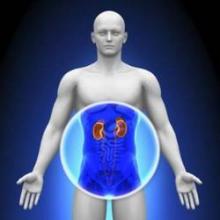Patiromer, an oral potassium binder that is not absorbed by the body, reduces elevated potassium levels in patients with chronic kidney disease who develop hyperkalemia while taking renin-angiotensin-aldosterone system inhibitors, according to a report published online Nov. 21 in the New England Journal of Medicine.
In an international prospective clinical trial, patients given patiromer also maintained normokalemia more effectively than did those given placebo. The agent did not induce an excessive decrease in potassium (hypokalemia), and the rate of gastrointestinal adverse effects was low, said Dr. Matthew R. Weir of the division of nephrology, University of Maryland, Baltimore, and his associates.
Patiromer, formulated as a powder mixed with water for oral administration, is a polymer that binds potassium in exchange for calcium, primarily in the distal colon where the concentration of free potassium is highest. It lowers serum potassium levels by enhancing fecal potassium excretion.
In the first phase of the industry-sponsored trial, 243 adults with chronic kidney disease were treated at 24 medical centers in Eastern Europe, 21 in the European Union, and 14 in the United States. A total of 92 patients had developed mild hyperkalemia and 151 had developed moderate to severe hyperkalemia while taking inhibitors of the renin-angiotensin-aldosterone system (RAAS) as protective therapy.
Most of the study participants were white men, and the mean age was 64 years; 97% had comorbid hypertension, 57% had type 2 diabetes, 42% had heart failure, and 25% had a history of MI. A total of 54% were taking diuretics in addition to RAAS inhibitors. The participants’ diet was not controlled during the trial, but patients were counseled frequently to restrict their intake of high-potassium foods and maintain a low-potassium diet.
In the first phase of the trial, participants with mild hyperkalemia were assigned in a single-blind fashion to receive a low dose of patiromer and those with moderate to severe hyperkalemia to receive a high dose of patiromer as an oral suspension given with breakfast and dinner each day for 4 weeks. The dose could be adjusted to reach and maintain a target potassium level for each patient.
Those who achieved normokalemia were then eligible to participate in the second phase of the trial, in which they were randomly assigned to either continue taking patiromer (55 participants) or to switch to a matching placebo (52 participants) for 8 more weeks. All patients were then followed for 1-2 weeks after discontinuing treatment.
In the first phase of the study, 76% of patients attained serum potassium levels in the target range. The proportion was similar regardless of whether patients had mild (74%) or moderate-to-severe (77%) hyperkalemia.
In the second phase, patients receiving continued patiromer maintained normokalemia, while those who switched to placebo showed a mean increase of 0.72 mmol/l in serum potassium level. The rate of recurrent hyperkalemia was 4 times lower with patiromrer (15%) than with placebo (60%). At the end of follow-up, 94% of patients who had taken patiromer were still able to continue their RAAS therapy, compared with only 44% of those who had taken placebo, Dr. Weir and his associates said (New Engl. J. Med. 2014 November 21 [doi:10.1056/NEJMoa1410853]).
Patiromer was generally well-tolerated. Mild to moderate constipation was the most frequent adverse event – affecting 11% of participants during the initial-treatment phase and 4% during the second phase – and it was not treatment limiting. There were few serious adverse events, and none were attributed to patiromer. The rates of all other adverse events were similarly low in the two study groups.
In particular, hypokalemia was “uncommon and reversible” among patients who took patiromer, “which suggests that it may be mitigated by monitoring serum potassium levels and adjusting the dose of patiromer as needed,” the investigators said.
More study is needed to assess longer-term treatment than the 12 weeks evaluated in this trial, they added.
This study was sponsored by Relypsa. Dr. Weir reported ties to Relypsa, ZS Pharma, Akebia, Janssen, AstraZeneca, Otsuka, Amgen, Merck Sharp & Dohme, AbbVie, Novartis, and Boston Sandoz; his associates reported ties to numerous industry sources.


